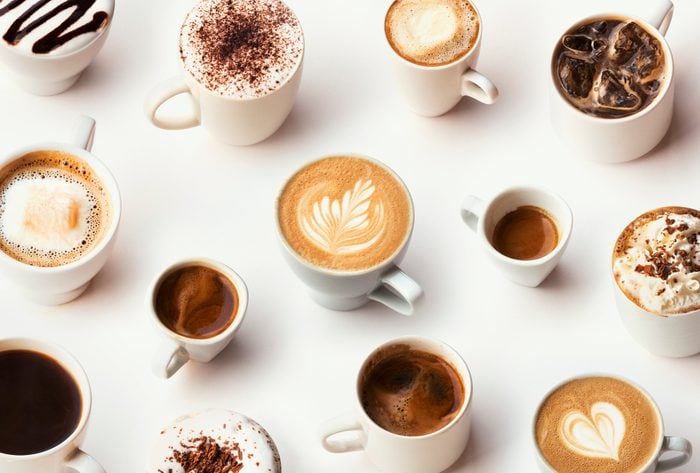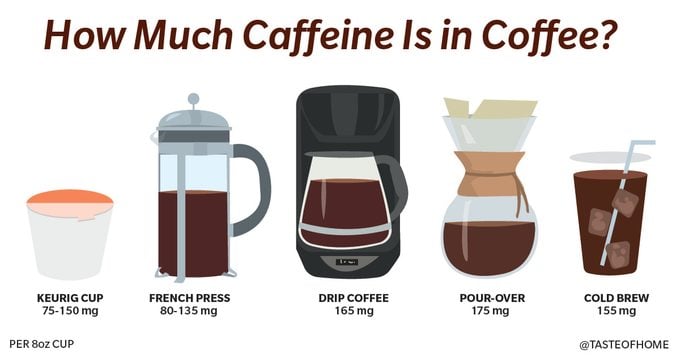How Much Caffeine Is in a Cup of Coffee?
Updated: Jan. 20, 2023

Whether you drink Starbucks or brew coffee at home, we can help you get more bang for your buck. Find out how much caffeine is in your favorite coffee.
Coffee lovers, we have some bad news: No two cups of joe are completely the same. So if you’re spending big bucks on your daily morning brew—figuring out Starbucks cup sizes and wondering what the heck a macchiato is—don’t you want to maximize its rise-and-shine caffeine powers? As it turns out, the milligrams of caffeine per fluid ounce of coffee varies. So how is one to know how much caffeine is in a cup of coffee, anyway? Java is only one of the best sources of caffeine.

How much caffeine is in a cup of coffee?
The amount of caffeine in a cup of coffee depends on a few factors, including grind size, water temperature, time, and brewing style, according to Megan Meyer, PhD, the Director of Science Communication at the International Food Information Council Foundation. So does the type of coffee beans and roasting technique, adds Malina Malkani, MS, RD, CDN, media spokesperson for the Academy of Nutrition and Dietetics. Lighter “blonde” roasts contain more caffeine than darker roasts—but darker roasts have a stronger flavor. Since there are so many things that impact the amount of caffeine coffee has, the numbers below are an average estimate, according to Meyer and Malkani.
Here’s how much caffeine is in a cup of coffee:
| Brewed coffee: | 70-200mg (95mg on average) |
| Decaf coffee: | 2-4mg (3mg on average) |
| Espresso: | 47-75mg (63mg on average) |
| Instant: | 65-80mg |
| Single-shot latte: | 47-75mg |
| Keurig cup: | 75-150mg |
| French press | 80-135mg |
| Drip coffee: | 165mg |
| Pour-over: | 175mg |
| Cold brew: | 155mg |
How much caffeine is in coffee from chains?
Starbucks
For people who prefer buying their coffee, the amount of caffeine per brand also varies because of different factors. Some brands offer way more caffeine than run-of-the-mill home-brewed coffee—like Starbucks. How much caffeine is in a cup of coffee from Starbucks? Of course, it depends on the cup size. A brewed cup from the brand has 155mg of caffeine in a short, eight-ounce cup; 235mg in a tall, 12-ounce cup; 310mg in a grande, 16-ounce cup; and 410mg in a venti, 20-ounce cup.
McDonald’s
McDonald’s coffee might be a cheap on-the-go alternative, but how much caffeine is really in their coffee? The brand reportedly doesn’t standardize the amount of caffeine in their coffee. Estimates for caffeine in a brewed cup of coffee from the Golden Arches are 109mg in a small, 12-ounce cup; 145mg in a medium, 16-ounce cup; and 180mg in a large, 21 to 24-ounce cup. Coffee is an important part of the McDonald’s menu, which has changed a lot over the years.
Dunkin’
Of course, you can’t leave out Dunkin’ in a coffee or caffeine comparison. The chain has 150mg of caffeine in a small, ten-ounce cup; 210mg in a medium, 16-ounce cup; 300mg in a large, 20-ounce cup; and 359mg in an extra-large, 24-ounce cup.
Death Wish
If you’re looking for some serious energy and caffeine, pick up a bag of Death Wish (available at major supermarkets near you) to brew at home. The self-proclaimed brewer of the world’s strongest coffee is no lie; just one cup contains a whopping 54.2mg per ounce of caffeine. But don’t worry, the brand assures us, one cup won’t literally kill you. In fact, it turns out that you can drink way more coffee than originally thought—and actually live longer, too.
How much caffeine is safe per day?
It doesn’t matter if you prefer making coffee at home or buying it at Starbucks, Dunkin’, McDonald’s, or another chain coffee brand—having too much caffeine has some side effects. Although coffee is high in antioxidants that promote good health, too much caffeine can disturb sleep, increase anxiety, or cause heart palpitations, according to Malkani. Caffeine sensitivity varies, but moderate caffeine consumption is in the range of 300 to 400 milligrams per day—about three to four eight-ounce cups of home-brewed coffee per day—according to Meyer. The FDA has cited that 400 milligrams a day is considered safe and is “not generally associated with dangerous, negative effects.” Caffeine does have an impact, however, and these 7 things happen to your body when drinking coffee every day. And if you accidentally spill your cup of Joe, here’s a guide on how to remove coffee stains.
Sources:
- Megan Meyer, PhD, Director of Science Communication at the International Food Information Council Foundation
- Malina Malkani, MS, RD, CDN, media spokesperson for the Academy of Nutrition and Dietetics
